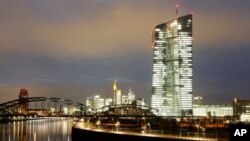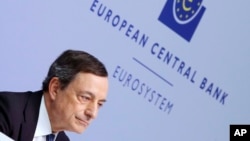The European Central Bank unleashed a new round of economic stimulus measures Thursday, making a new effort to boost the moribund economic fortunes in the 19-country bloc that uses the euro currency.
The continent's central bank cut all of its key interest rates, increased its monthly asset-buying program and announced new, cheap loans for banks in hopes that they in turn would lend the money to businesses and consumers to boost the region's economy.
The eurozone economy has been virtually stalled for several years, advancing only three-tenths of a percent in the last three months of 2015.
ECB policymakers cut their main refinancing rate from the already-low figure of .05 percent to zero, further stiffened the punitive rate it charges banks that deposit money with it from a negative three-tenths of a percent to minus four-tenths of a percent and said they would ramp up their stimulative purchase of bonds from $60 billion a month to $85 billion.
Deja vu
All of the measures are similar to tactics that the U.S. central bank, the Federal Reserve, adopted several years ago to boost the world's largest economy from the depths of the 2008-2009 recession, its steepest downturn since the Great Depression of the 1930s.
Since then, the U.S. economy has markedly recovered, with its unemployment rate dropping to 4.9 percent, even as economic growth has not been as fast as central bank policymakers would like and many workers are still looking for better-paying, full-time jobs rather than the part-time work they accepted. World economic fortunes have been waning in recent months, however, with growth slowing in China, the second biggest global economy.
The eurozone jobless rate is down from its 2013 peak of 12.1 percent, but was still at an elevated figure of 10.3 percent in January.
European Central Bank president Mario Draghi said the bank's new stimulative measures show "that we are not out of ammunition."
He said, "Rates will stay low, very low, for a long period of time and well past the horizon of our purchases" of assets.
But he added, "From today's perspective and taking into account the support of our measures to growth and inflation, we don't anticipate that it will be necessary to reduce rates further."





